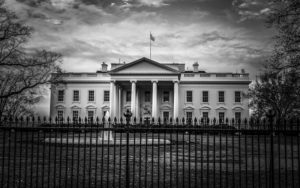
Court backs President Trump’s deployment powers, Senate fails again to move on shutdown pay, and more…
IN THE NEWS
- A federal appeals court ruled that the federal government is allowed to send the Oregon National Guard to Portland, Oregon. The court held that President Donald J. Trump had the statutory authority to deploy the troops. The Trump Administration previously approved the deployment of 200 Oregon National Guard members for 60 days and claimed troops were needed to protect an Immigration and Customs Enforcement facility in Portland after a series of protests. The state of Oregon and the city of Portland argued that this action exceeded federal authority, and a district court temporarily blocked the deployment.
- A federal judge heard testimony from U.S. Customs and Border Protection officials at a hearing over whether immigration officers in Chicago violated restrictions on the use of tear gas and rubber bullets against nonviolent protestors and journalists. Judge Sara Ellis of the District Court for the Northern District of Illinois previously ordered officers to wear body cameras due to concern over the continued use of violent tactics despite her order. A Customs and Border Protection official reportedly testified that all officers are now wearing body cameras. Another official reportedly defended one usage of tear gas as permitted under Ellis’s order because officers first warned protestors, after they locked arms to block an officer’s vehicle.
- The Senate rejected the Shutdown Fairness Act, a bill that would have allowed executive agency heads to continue to pay and provide benefits to federal employees, including military servicemembers, during government shutdowns. The Senate has failed to pass a full funding bill that would end the current shutdown, which began on October 1. The proposed bill would have applied retroactively, providing back pay. Senate Majority Leader John Thune (R-S.D.), in support of the bill, reportedly emphasized that many federal workers missed their first paycheck last Friday.
- President Trump announced sweeping sanctions on Russia’s two largest oil companies, Rosneft and Lukoil, marking his administration’s first sanction against Russia since retaking office. The sanctions, coordinated with NATO countries and unveiled alongside NATO Secretary General Mark Rutte, target companies responsible for nearly half of Russia’s oil output in an effort to pressure President Vladimir Putin to end the war in Ukraine. Secretary of the U.S. Department of the Treasury Scott Bessent said the penalties reflect that “now is the time to stop the killing and for an immediate ceasefire,” and signaled that further sanctions could follow if Russia refuses to negotiate.
- President Trump and Australian Prime Minister Anthony Albanese signed a United States–Australia agreement to invest in production of rare earth metals—a critical component for consumer electronics, defense technologies, and semiconductor chips used for artificial intelligence development. The agreement could reduce U.S. dependence on China, which dominates global production—the United States relies on China for 80 percent of its rare earth imports. China tightened restrictions on mineral exports this month amid an escalating trade war with the United States. A White House official reportedly said that the new agreement includes over $3 billion of investment in the next six months.
- The U.S. Department of Justice announced an agreement with the University of Virginia (UVA) to halt its civil rights investigations into the school’s alleged discrimination and admissions policies. In return, UVA agreed to abide by a Justice Department memo providing guidance for recipients of federal funding. The Justice Department claimed this agreement will ensure the university does not engage in unlawful discrimination in hiring or admissions. UVA also agreed to send relevant data to the Justice Department until 2028. The Justice Department stated the investigations will be closed once the university “completes its planned reforms prohibiting DEI.”
- President Trump imposed a 25 percent tariff on all imports of medium- and heavy-duty trucks—including the parts to make those trucks—and a 10 percent tariff on all imports of buses. President Trump’s proclamation claimed that national security risks and the need to fortify the American manufacturing industry justify these tariffs. The Trump Administration will provide a credit, which offsets tariff liability, to manufacturers who must import certain parts to build in the United States.
- Virginia Democrats are preparing to reopen the state’s redistricting process in a move aimed at countering Republican-led midterm map changes nationwide. The plan, confirmed by Scott Surovell (D-Va.), Virginia Senate Majority Leader, would likely target the districts of Representatives Rob Wittman (R-Va.) and Jen Kiggans (R-Va.). To bypass Virginia’s bipartisan redistricting commission, lawmakers would need to advance a constitutional amendment through two legislative sessions and then win voter approval.
WHAT WE’RE READING THIS WEEK
- In a Brookings Institution essay, Lauren Bauer, a fellow in economic studies, and Diane Whitmore Schanzenbach, a senior fellow in economic studies, argue that changes to the Supplemental Nutritional Assistance Program (SNAP) made by President Trump’s megalaw this summer will impair SNAP’s effectiveness during economic recessions. They argued that with states now shouldering greater costs, some will reduce SNAP funding during downturns, so instead of growing in usage to counter recessions, SNAP will shrink along with the economy. Bauer and Schanzenbach also noted that because unemployment often increases during recessions, new work requirements for SNAP eligibility mean that as recessions worsen, more individuals will be rendered ineligible. Bauer and Schanzenbach advocate reversing the changes to restore SNAP’s countercyclical quality.
- A recent report by the U.S. Government Accountability Office (GAO) examined how the Federal Emergency Management Agency (FEMA) has responded to states and localities experiencing extreme heat events. GAO noted that extreme heat is the leading weather-related cause of death in the United States, and that these events are projected to increase in intensity, frequency, and duration. GAO observed that FEMA provided minimal assistance through grant programs to local governments to mitigate against extreme heat events. GAO recommended that FEMA evaluate gaps in its heat-related programs and include more extreme heat projects in its agency cost-benefit analyses. GAO reported, however, that FEMA resisted the latter recommendation and said calculating benefits would be too difficult.
- In a Michigan Journal of International Law article, J. Benton Heath, associate professor at Temple University Beasley School of Law, described sanctions as a form of “insurgent legal ordering”—systems of rules and coercion that create new legal and political orders outside state control. By drawing on early twentieth-century Chinese boycotts against Western powers, Heath showed that these citizen-led movements operated with rules, enforcement, and penalties. Western lawyers and diplomats responded by stating that only states could wield economic warfare, a move that consolidated state authority while laying the foundation for modern sanctions regimes. Heath contended that modern-day, powerful countries like the United States use sanctions to regulate the global economy much as insurgent actors once did within states, turning sanctions themselves into a force that blurs the boundary between law, coercion, and international power.
EDITOR’S CHOICE
- In an essay in The Regulatory Review, Elizabeth Flatley, a law clerk at Vinson & Elkins LLP, analyzed U.S. efforts to diversify the nation’s supply of critical minerals. Flatley outlined past U.S. attempts at international partnership, such as with Australia and the European Union, but observed that no agreement meaningfully reduced the United States’ dependence on China for most of its critical minerals. Although global demand stems partly from the minerals’ use in clean energy technologies, Flatley observes that a recent executive order calling for greater domestic production instead cited national security and job creation as motivations. Still, she notes that adoption of clean energy elsewhere will impact U.S. plans to diversify its mineral supply.



